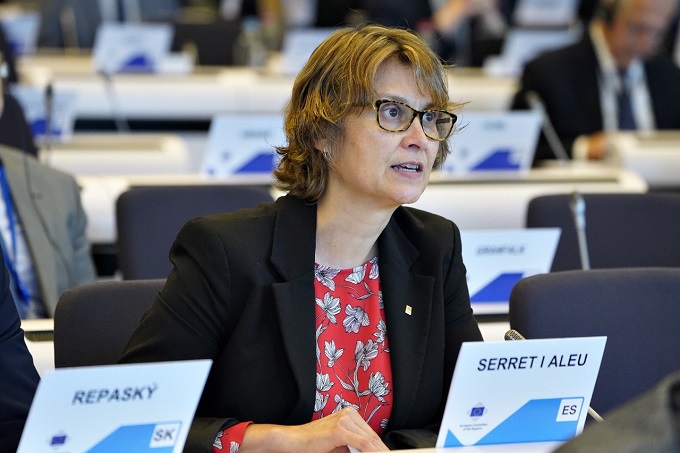- Minister Meritxell Serret spoke at the plenary session of the Committee of the Regions, in the European Commission, in the debate on water scarcity and drought

The Minister for Foreign Action and European Union, Meritxell Serret i Aleu, travelled to Brussels, where yesterday, together with the Ukrainian ambassador to the EU, she took part in the presentation of the exhibition “Life conquers death. Ukraine today” at the Espai Catalunya Europa, while today she spoke at the 155th plenary session of the Committee of the Regions, in the European Commission.
Serret took part in the debate on water scarcity and drought. In her speech, the Minister reiterated that “climate change obviously has consequences, such as drought, and these consequences know no borders.” Therefore, “European policies are needed to help us to tackle and address them in a comprehensive manner,” she pointed out.
She also stressed that “the Mediterranean is the area where this drought is most keenly felt”, and explained that, in Catalonia in 2022, the average temperature rose by 2.7°C and currently, “the levels of our reservoirs in the internal basins that we manage are at 25%, a critical situation.”
“Since 2021, the Government of Catalonia has promoted actions of anticipation, planning, dialogue and investment,” explained Serret. The Catalan government is working with a water management plan for the period 2022-2027, for which 2.4 billion euros have been earmarked. “With this money we seek to boost investment: to produce more water, by desalination, regeneration, while also modernising irrigation, and through other actions to become much more efficient,” she explained.
However, for this reason, environmental management “with investment to support and promote ecosystems and the water cycle” is also necessary. According to Serret, the most important thing of all is “governance based on consensus among all stakeholders, mainly the primary sector, with major support for the municipalities.”
In Catalonia, the Government manages 52% of the territory, 90% of the population and 40% of water resources. The other part of the territory is managed and depends on the Ebro Confederation. “We have found that the part managed by the Confederation falling within state purview has failed to provide sufficient planning; they have been slow to get going and measures have been taken without consensus, which has aggravated the crisis,” denounced Minister Serret at the plenary session of the Committee of the Regions.
“Our lives are at stake,” was her forceful message. “We must be able to act with multilevel governance,” she insisted, “which is why we propose setting up the Mediterranean macroregion, to promote this multilevel cooperation, to be more efficient and for Mediterranean challenges to be understood as European challenges, with a bigger strategy and a greater positive local impact.” Because “the future of the Mediterranean and the European Union go hand in hand,” she concluded.
Meeting with the State Secretary of Baden-Württemberg
On the second day of her trip to Brussels, Minister Serret also met with the State Secretary of Baden-Württemberg, Florian Hassler. At the meeting, Serret and Hassler discussed the priorities of the Four Motors for Europe cooperation network (of which Catalonia and Baden-Württemberg are members, along with Lombardy and Auvergne-Rhône-Alpes) and shared initiatives in energy and digital sovereignty.
